
Joy and peace: Cookout gives community a taste of home
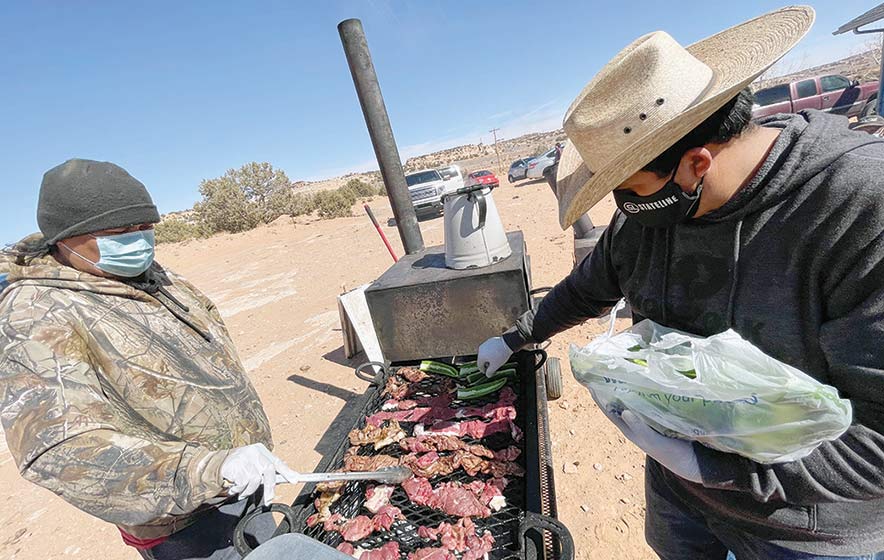
Special to the Times | Krista Allen
Customers wait in a line of vehicles as cooks Kenneth Iron, left, and Stanford Skacy, grill mutton and chilis during the Bigman family mutton sale in Coppermine, Ariz., on Saturday morning.
By Krista Allen
Special to the Times
BÉÉSH HAAGÉÉD, Ariz.
The smell and taste of mutton still offers comfort, even when people are waiting in their vehicles, said Dawn Hiss.
“We even had an order that was delivered to Reno, Nevada,” Hiss said on Saturday morning, during her family’s first mutton sale since the coronavirus shut down the flea markets across the Navajo Nation.
“That was our first order,” she said, “and that just tells how much joy and peace it brings to people – just remembering what times were before COVID happened and remembering our grandmas and grandpas. That’s a taste of home.”
In addition to the tragic losses of life and health and jobs because of the pandemic, many Diné families are also experiencing loss of special meals, gatherings, being together with family, and even going to flea markets for neeshjízhii or a Navajo burger with dah diníilghaazh and ahwééh.
“My dad always says, ‘Every time you’re craving something, and you can’t satisfy your craving, you’re (actually) craving mutton.’ And just to eat it, it makes you feel better,” said Hiss, who grew up here sheepherding with her sister, Kelly Skacy. “That’s healing.”
Sisters Dawn and Kelly’s family began preparations for the mutton sale last Thursday, when they butchered a Navajo Churro sheep and continued food preparations all day Friday.
On Saturday morning, tables were set up and fires were built to grill mutton and chilies and to keep the coffee hot.
Facebook post
Days earlier, Kelly posted on Facebook that there would be a 10 a.m. mutton sale at Herbert and Nancy Bigman’s residence. She also asked visitors to wear their facemasks.
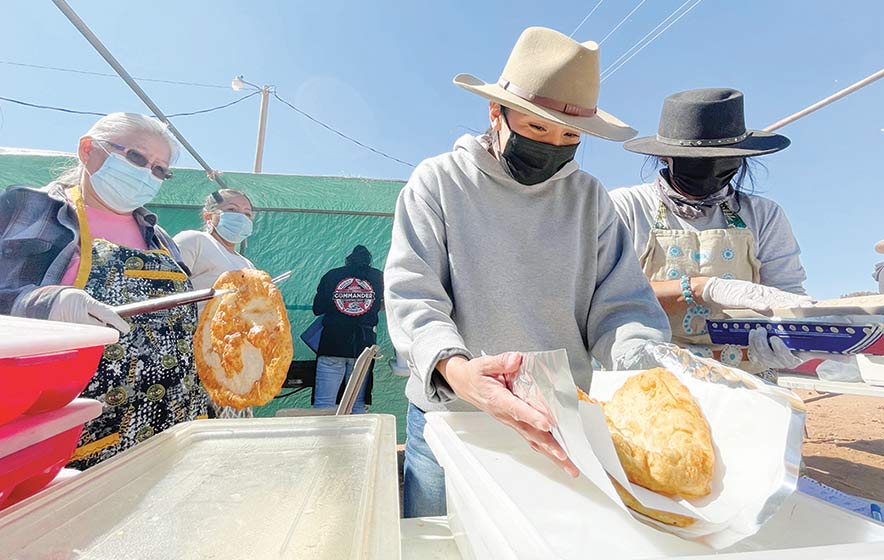
Special to the Times | Krista Allen
Francis Yazzie waits to place a hot fry bread into a container as Kelly Skacy (black Stetson hat) helps her sister, Dawn Hiss, wrap dah diníilghaazh for customers during their family’s mutton sale in Coppermine, Ariz.
“We had people here before 10 o’clock waiting by the time we got the fire going,” said Stanford Skacy, Kelly’s husband, who did the grilling with neighbor Kenneth Iron.
“We had people already waiting in their vehicles,” he said. “And by the time we had our first batch (of mutton on the grill) we had a whole line of people. It was quite a rush. We stayed busy throughout the entire time.”
Hiss said some people waited for more than an hour, but no one left. Visitors came from as far as Tónaneesdizí.
The mutton sale ended around noon when some people were still waiting in line for food.
Hiss said they knew their customers were grieving the losses of COVID-19 and that the pandemic has taken an incalculable death toll. But she and her family also know that mutton and traditional food such as blue corn mush stretches beyond the realm of vitamins and minerals.
“The sheep eat the plants that Mother Nature provides and they’re all medicine, and they drink very good water,” Kelly explained. “We take very good care of our sheep. They’re nurtured by us and they’re loved by us.
“We also have Navajo tea, which is natural healing and blue corn mush that’s grown on Navajo,” she said. “So, yes, the food brings natural healing. I hope it replenishes everybody’s mind, body and soul.”
Mutton Curve closed
Stanford said before COVID-19 entered the Navajo Nation, he and Kelly usually had a mutton concession at LeChee’s “Mutton Curve,” the community flea market site.
“They closed Mutton Curve down, so this is our first time doing it again, more than a year later,” Stanford said. “We figured if we do it out here (in Coppermine), people will be spread out.”
Stanford and Kelly said they’ve been staying home and limiting their exposure to the virus by maintaining their livestock and taking care of things around the house.
“We stay away from towns,” Stanford said, adding that Kelly’s family recently lost an uncle. “But food brings healing. The entire community, they love our cooking. We use firewood.”
Stanford said there’s something about the flavor when cooking over a wood fire that can’t be duplicated using charcoal briquettes. Perhaps it’s the slow blistering heat from the coals with smoke from the local wood into the mutton that gives it a “Coppermine taste,” said Stanford.
“There’s a different taste to it and it makes people happy,” he said. “Coppermine taste, that’s how we describe it,” he said. “That’s pretty much the whole difference. And it makes a big difference. I’m usually the cook.”
As the smell of mutton wafted through the air on Saturday morning and traditional Diné songs playing in the background, Francis Yazzie and Julia Stevens made fry bread. Dawn’s and Kelly’s elders also watched the morning rush.
Dawn and Kelly took orders, ran to and from vehicle to vehicle to deliver food, and made sure every one of their customers left happy.
They told jokes and laughed with their family as cars left one by one.
“There’s just something about sitting around with all your relatives and just enjoying food and that nice, greasy fry bread,” Hiss added.
Isolating in Coppermine
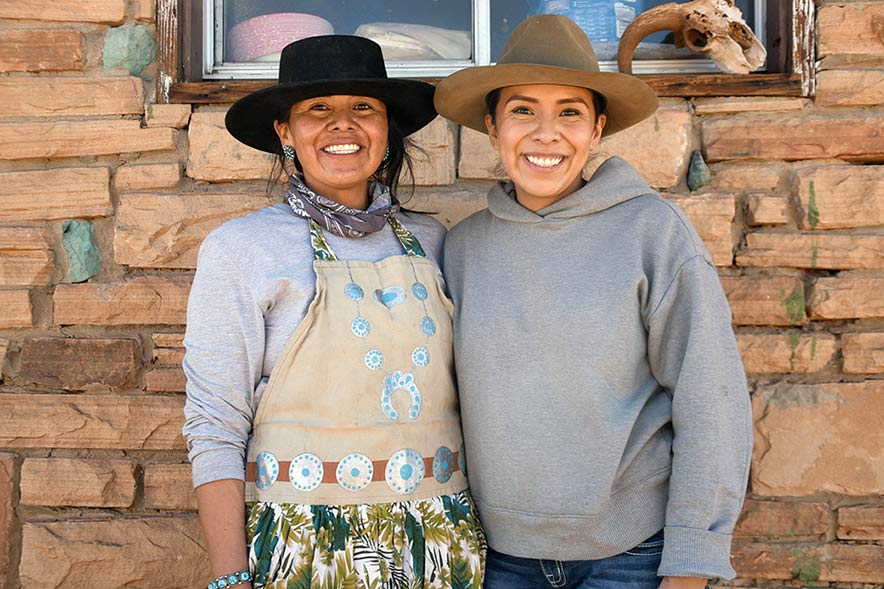
Special to the Times | Krista Allen
Wearing their Stetson hats, sisters Kelly Skacy, left, and Dawn Hiss in front of a stone house made with local natural rock slabs and local copper, or béésh dootł’izh, at their family’s homestead in Coppermine, Ariz., on Saturday afternoon.
Sisters Dawn and Kelly grew up learning everything about raising livestock (for profit), butchering, fixing pelts, and shearing wool.
“We’re definitely sheep herders,” Hiss said. “Our entire lives we’ve been here. Our grandmothers and our great-great grandmothers had sheep, and our dad just carried on the tradition.
“We have a family of girls, so our entire lives we’ve been around sheep,” she said. “And we can do everything.”
Stanford said he is not only part of a close-knit family but also a close-knit Coppermine community.
“We’re still in the pandemic and we still have to stay six feet apart and wear our face masks even though people are getting vaccinated,” Stanford said. “The virus is still around. It’s still there, but we’ve got to wait. It’s going to take a while. We’re trying our best here.”
“It’s been really hard,” Kelly added. “My dad’s a sociable person and (pre-pandemic) we would drive to flea markets for mutton sales and just being out and talking, shaking people’s hands. Now, we have to wear a mask.
“Overall, it’s been hard,” she said. “And it’s been hard on my dad. We have to constantly remind him: ‘Dad, you can’t just go to somebody’s house because you don’t know their rules.’ So, it took us a while to adjust to the lifestyle now. It’s really hard to adjust to the lifestyle.”
Hiss added, “We’re very sorry for the people who’ve been affected by COVID. But just all the teachings we have and the strength that they gave their families. We’ve got to lean on one another and help one another.
“We’re definitely thinking of everyone and we wish they could be here enjoying some mutton sandwiches with us because we’ve got the best mutton,” she said.
As a public service, the Navajo Times is making all coverage of the coronavirus pandemic fully available on its website. Please support the Times by subscribing.
How to protect yourself and others.
Why masks work. Which masks are best.
Resources for coronavirus assistance

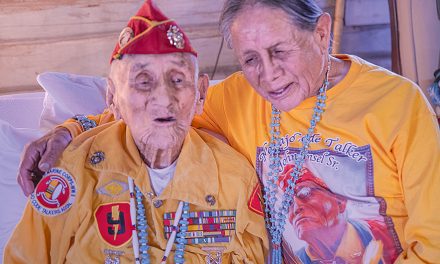
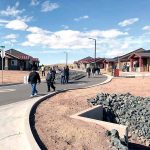





 Highway 264,
Highway 264, I-40, WB @ Winslow
I-40, WB @ Winslow